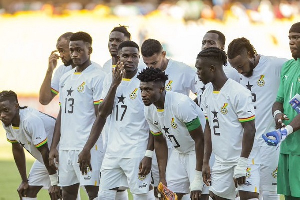When is a Conflict of Interest not a Conflict of Interest?
In his first 2014 press conference, President John Mahama stated, "I recalled that the attention of President John Evans Atta Mills and I, then Vice-President, was drawn to the fact that Merchant Bank was in trouble and that the bank would collapse because of the debts that were owed it. The President called a meeting, which I attended to discuss the distress in which Merchant Bank was. One of the debtors of Merchant Bank was Engineers and Planners, wholly owned by my younger brother. I must say that out of that meeting, no intervention was made to direct Merchant Bank to do anything. At no time had I used executive power to try and influence Merchant Bank to do anything. I, therefore, have not played any role that showed a conflict of interest."
If the President truly believes what he said then he has an extremely unlimited understanding of conflict of interest. More importantly, because the statement has a strong potential to poison the minds of the citizenry on what constitutes conflict of interest and abuse of public office, it must be robustly denounced, debunked and discredited and devalued.
It is now well known that Engineers & Planners (E&P), a company wholly owned by the President’s brother, borrowed $28 million from Merchant Bank in 2008. It is also well known that E&P has failed to repay the loan or the interest, which has proximately caused the demise of Merchant Bank, leading to the forced sale of the Bank to FORTIZ, an unknown private equity firm with political connections.
When the President says that his attention was drawn to Merchant Bank’s troubles, he omits the part about how his attention was drawn. It is on record that his brother drew his attention, in a letter written by LithurBrew&Company and obtained by JOYFM (see attached http://myjoyonline.com/docs/3345EandP.pdf and myjoyonline.com/docs/11522merchant.pdf).
Moreover, the President should stop defiling the memory of President Mills because we all now know that President Mills was in no position to be dabbling in such matters. The letter that drew his attention was written on July 4, 2012 and President Mills who was terminally ill passed away on July 24, 2012. Unless, of course, President Mahama had been involved in this saga long before the July 4, 2012 letter.
The President seems to be highlighting that his involvement was due to Merchant Bank’s troubles and its imminent collapse. Let the President put on record the specific steps he took or recommended to save Merchant Bank from collapse. In fact, we know that the loan was never repaid and Merchant Bank did collapse. Thus, the intervention hastened the collapse of Merchant Bank and did nothing about the repayment of the loan, which was exactly why E&P sought the involvement of the President. It is sad that the President will assert that, “out of that meeting, no intervention was made to direct Merchant Bank to do anything.” How could he be directed to attend a meeting on the collapse of Merchant Bank only for the meeting to conclude that no intervention is necessary? This does not sound plausible, at best, or evidences gross negligence, at worst.
It is also well known that LithurBrew&Company is no ordinary law firm. Tony Lithur, a partner of the firm, also represents FORTIZ, the private equity firm that eventually bought Merchant Bank, beating other companies that put in more attractive bids. “Coincidentally,” Tony Lithur represented President Mahama at the Supreme Court during the election petition and his partner, Marietta Brew, is and still serves as the President’s Attorney General and Minister of “Justice.”
If a Professor was writing a case to teach conflict of interest, he could do no better than the facts described above. A conflict of interest is said to exist when there is a risk that one’s judgment or actions regarding a primary interest will be unduly influenced by a secondary interest. For instance, the primary interest of performing the duties of public office could be unduly influenced by a secondary interest of doing favors for family and friends.
It must be highlighted that the “conflict” is not dependent on whether the decision maker is actually influenced by the secondary interest. The conflict exists if it is reasonably believed that the circumstances create a risk that decisions may be unduly influenced by the secondary interest. This is precisely why the President’s statement to the effect that he had not used executive power to try and influence Merchant Bank to do anything; therefore, he has “not played any role that showed a conflict of interest," is patently nonsensical.
Plainly, the President’s involvement in this loan affair created a risk that his decisions will be unduly influenced by a desire to protect his brother’s assets, which the bank probably wanted to seize. In fact, because his brother’s letter triggered his involvement, it can easily be argued that protecting his brother’s assets was his primary interest in the case.
As it turns out, his brother never repaid the loan and the bank never seized his assets, warranting the reasonable inference that his brother accomplished all his goals in getting the President involved. Thus, in this case, there is also a high probability that the President’s decision was actually influenced, to the benefit of his brother but detriment of the Bank.
Ghana’s Constitution frowns upon such conflicts of interest. At Article 284, it provides that “A public officer shall not put himself in a position where his personal interest conflicts or is likely to conflict with the performance of the functions of his office.” The President also takes an oath to preserve, protect and defend the Constitution at all times. Unfortunately, the Constitution is not self-enforcing. Thus, the words therein are only meaningful if the organs that it creates are capable, conscientious and committed to constitutionalism.
Parliament has a mandatory oversight responsibility in such matters. We have learnt that 80 MPs have appropriately called for an investigation into this sordid affair. But the President’s handpicked Speaker will not allow the investigation, providing additional evidence that Parliament is less effective than a toothless bulldog. As a political institution, some level of partisanship is to be expected from Parliament. But one would expect that such partisanship, in the face of these facts, would take the form of whether to impeach the President (the opposition party) or just to censure him (the President’s party). But the 275-member chamber cannot even discuss this repugnant affair? Please, let us take governance a little more seriously!
The constitution also provides that “an allegation that a public officer has contravened or has not complied with a provision of this Chapter shall be made to the Commissioner for Human Rights and Administrative Justice.” However, who believes that making such an allegation to Commissioner Lamptey, another handpicked Presidential appointee, will make any difference? There is also widespread belief that the Courts do not take the words in the constitution seriously. For instance, we all now know that “shall” means “may” to our Justices, “purposively” speaking!
The President’s unconscionable statement and the unwillingness and inability of our institutions to set the record straight come with a substantial risk that the citizenry will accept that the President’s involvement in his brother’s dealings with Merchant Bank, which eventually collapsed the Bank, present no conflict of interest situation and is apt. Au contraire, it must be said loudly, boldly and repeatedly that the President’s actions are extremely unacceptable, impeachable in most civilized polities, censurable at a minimum and not worth emulating by other public servants.
Merchant Bank is owned by SSNIT, a trustee of workers’ pension funds. It is just not right for the collective contributions of workers to be siphoned to the President’s brother only for the President cronies to buy the carcass of Merchant Bank.
How long can we sustain this culture of siphoning our collective resources to the politically connected, in the form of unpaid loans, judgment debts, divestitures, and loan guarantees? How long can we be told that a clear conflict of interest situation is not a conflict of interest?
Opinions of Saturday, 11 January 2014
Columnist: Asare, Kwaku S.






![Former President Akufo-Addo [L] and Okatakyie Afrifa Mensah Former President Akufo-Addo [L] and Okatakyie Afrifa Mensah](https://cdn.ghanaweb.com/imagelib/pics/587/58758132.295.jpg)











